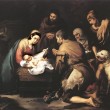Christmas
Christ … came to make a new and better beginning of all things than Adam had been, and to be a fountain-head from which all good henceforth might flow … He came to new-create, – to begin a new line, … Continued
 “The Lord thy God will raise up unto thee
“The Lord thy God will raise up unto thee
a Prophet from the midst of thee, of thy brethren, like unto me;
unto Him ye shall harken.” – Deut. 18:15.
The history of Moses is valuable to Christians, not only as giving us a pattern of fidelity towards God, of great firmness, and great meekness, but also as affording us a type or figure of our Saviour Christ.
 Let us pray Him to bless what we venture for Him, that we may not only labour, but may receive our wages, and gather fruit unto life eternal. This world is a very little thing to give up for the next.
Let us pray Him to bless what we venture for Him, that we may not only labour, but may receive our wages, and gather fruit unto life eternal. This world is a very little thing to give up for the next.

(Lent)
“Drink no longer water,
but use a little wine for thy stomach’s sake,
and thine often infirmities.” –
1 Tim. 5:23.
This is a remarkable verse, because it accidentally tells us so much. It is addressed to Timothy, St. Paul’s companion, the first Bishop of Ephesus. Of Timothy we know very little, except that he did minister to St. Paul, and hence we might have inferred that he was a man of very saintly character;

(FIFTH SUNDAY IN LENT)
“Ye know the grace of our Lord Jesus Christ, that, though He was rich, yet for your sakes He became poor, that ye through His poverty might be rich.”
2 Cor 8:9
As time goes on, and Easter draws nearer, we are called upon not only to mourn over our sins, but especially over the various sufferings which Christ our Lord and Saviour underwent on account of them.

From the earliest times down to this day, these weeks before Easter have been set apart every year, for the particular remembrance and confession of our sins.

(Second Sunday in Lent)
“And when Esau heard the words of his father, he cried with a great and exceeding bitter cry, and said unto his father, Bless me, even me also, O my father.” – Gen. 27:34.
I suppose no one can read this chapter without feeling some pity for Esau. He had expected that his father would give him his blessing, but his brother was beforehand with him and got the blessing instead. He did not know what had happened, and he came in to his father to be blessed, without any suspicion that he was not to be blessed.
 “Surely I have behaved and quieted myself, as a child that is weaned of his mother: my soul is even as a weaned child.” – Psalm 131:2.
“Surely I have behaved and quieted myself, as a child that is weaned of his mother: my soul is even as a weaned child.” – Psalm 131:2.
Self-denial of some kind or other is involved, as is evident, in the very notion of renewal and holy obedience. To change our hearts is to learn to love things which we do not naturally love—to unlearn the love of this world; but this involves, of course, a thwarting of our natural wishes and tastes.
 PPS II-3, 25 December 1834
PPS II-3, 25 December 1834
“The Word was made flesh, and dwelt among us.” John 1: 14.
Thus does the favoured Apostle and Evangelist announce to us that Sacred Mystery, which we this day especially commemorate, the incarnation of the Eternal Word. Thus briefly and simply does he speak as if fearing he should fail in fitting reverence. If any there was who might seem to have permission to indulge in words on this subject, it was the beloved disciple, who had heard and seen, and…
 The Word was from the beginning, the Only-begotten Son of God. Before all worlds were created, while as yet time was not, He was in existence, in the bosom of the Eternal Father, God from God, and Light from Light,
The Word was from the beginning, the Only-begotten Son of God. Before all worlds were created, while as yet time was not, He was in existence, in the bosom of the Eternal Father, God from God, and Light from Light,